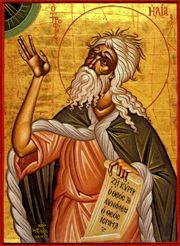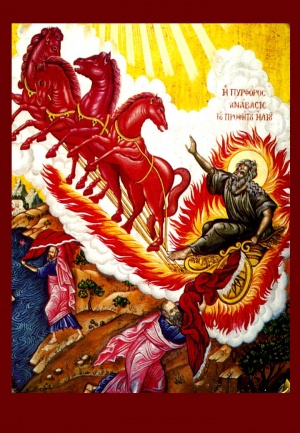Elijah
The glorious Prophet Elijah (Hebrew: אליהו), also Elias (NT Greek Hλίας), is a prophet of the Hebrew Bible or Old Testament. His name has been variously translated as "whose God is the Lord," "God the Lord," "the strong Lord," "God of the Lord," "my God is the Lord," "the Lord is my God," and "my God is Jehovah." His feast day is celebrated on July 20.
Contents
Old Testament
Elijah is first introduced in 1 Kings 17:1 as delivering a message from God to Ahab, king of Israel. He is sometimes known as the "Tishbite," being from the town of Tishbe.
Having delivered his message to Ahab, he retired at the command of God to a hiding-place by the brook Cherith, beyond Jordan, where he was fed by ravens. When the brook dried up God sent him to the widow of Zarephath, a city of Zidon, from whose scanty store he was supported for the space of two years. During this period the widow's son died, and was restored to life by Elijah (1 Kings 17:2-24).
During these two years a famine prevailed in the land. At the close of this period of retirement and of preparation for his work, Elijah met Obadiah, one of Ahab's officers, whom he had sent out to seek for pasturage for the cattle, and bade him go and tell his master that Elijah was there. The king came and met Elijah, and reproached him as the "troubler of Israel." It was then proposed that sacrifices should be publicly offered, for the purpose of determining whether Baal or the Israelite God was the true God. This was done on Mount Carmel; the result was that a miracle took place convincing those watching that Baal was false and that the Israelite God was real. The prophets of Baal were then put to death by the order of Elijah.
Jezebel, enraged at the fate that had befallen her priests of Baal, threatened to put Elijah to death (1 Kings 19:1-13). He therefore fled in alarm to Beersheba, and went alone into the wilderness, and sat down in despondency under a juniper tree. As he slept, an angel touched him, and said unto him, "Arise and eat; because the journey is too great for thee." He arose and found a cake and a cruse of water. Having partaken of the provision, he went forward on his way for forty days to Horeb, where he took residence in a cave. Here God appeared to him and said, "What dost thou here, Elijah?" In answer to Elijah's despondent words God manifests to him his glory, and then directs him to return to Damascus and anoint Hazael king over the Arameans (Syria), Jehu king over Israel, and Elisha to be prophet in his room (1 Kings 19:13-21; compare 2 Kings 8:7-15; 9:1-10).
Some six years after this, he warned Ahab and Jezebel of the violent deaths they would die (1 Kings 21:19-24; 22:38). He also, four years afterwards, warned Ahaziah, who had succeeded his father Ahab, of his approaching death (2 Kings 1:1-16). During these intervals he probably withdrew to some quiet retirement, no one knew where. His interview with Ahaziah's messengers on the way to Ekron, and the account of the destruction of his captains with their fifties, suggest the idea that he may have been in retirement at this time on Mount Carmel. The Carmelites have a tradition that they were founded by Elijah at this time.
The time now drew near when he was to be taken up into heaven (2 Kings 2:1-12). He went down to Gilgal, where there was a school of prophets, and where his successor Elisha, whom he had anointed some years before, resided. Elisha was distraught by the thought of his master's leaving him, and refused to be parted from him. The two went on and came to Bethel and Jericho, and crossed the Jordan, the waters of which were "divided hither and thither" when smitten with Elijah's mantle. Upon arriving at the borders of Gilead, which Elijah had left many years before, it "came to pass as they still went on and talked" they were suddenly separated by a chariot and horses of fire; and "Elijah went up by a whirlwind into heaven," Elisha receiving his mantle, which fell from Elijah as he ascended.
Elijah's chosen successor was the prophet Elisha; Elijah designated Elisha as such by leaving his mantle with him (2 Kings 2:13-15), so that his wish for "a double portion" of the older prophet's spirit (2:9), an allusion to the preference shown the first-born son in the division of the father's estate (Deuteronomy 21:17), had been fulfilled.
New Testament references
Elijah is frequently mentioned in the New Testament. In John 1:25 the priests and Levites said to John the Baptist, "Why baptizest thou, if thou be not that Christ, nor Elias?" Paul (Romans 11:2) refers to an incident in his history to illustrate his argument that God had not cast away his people. (See also Luke 4:25; 9:54.)
Elijah was similar to John the Baptist in the sternness and power of his reproofs (Luke 9:8). According to Matthew 11:11, he was the Elijah that "must first come" (Matt. 11:11, 14). In John the Baptist one can see "the same connection with a wild and wilderness country; the same long retirement in the desert; the same sudden, startling entrance on his work (1 Kings 17:1; Luke 3:2); even the same dress, a hairy garment, and a leather girdle about the loins (2 Kings 1:8; Matt. 3:4)."
Also, Elijah's appearance in glory on Mount Tabor at the Transfiguration does not seem to have startled the disciples. They were "sore afraid," but not apparently surprised.
According to prophecies of the holy Fathers God will send Elijah and Enoch before coming of the Antichrist to bear witness for Christ on the earth and to strengthen the faithful.
Elijah in local traditions
Aside from holding a special place in the devotions of Arab Christians, in many Slavic nations Elijah is sometimes referred to as Gromovik (literally "Thunderer"). This is partially due to local mythology, which compares Elijah's fiery chariot to that of Perun, the defunct Slavic god of storms, snows, and rains.
Hymns
Troparion (Tone 4)
- An angel in the flesh and the cornerstone of the prophets,
- the second forerunner of the coming of Christ,
- Glorious Elijah sent grace from on high to Elisha,
- to dispel diseases and to cleanse lepers.
- Therefore, he pours forth healings on those who honor him.
Kontakion (Tone 2)
- Prophet Elijah of great renown,
- seer of the mighty mighty works of God,
- by your command you held back the rain!
- Pray for us to the only Lover of mankind!
Source
External links
- Holy, Glorious Prophet Elijah (OCA)
- Elias the Prophet (GOARCH)
- Augustine of Hippo. Chapter 29.—Of the Coming of Elias Before the Judgment, that the Jews May Be Converted to Christ by His Preaching and Explanation of Scripture. In: CITY OF GOD. Book XX, Chapter 29. NPNF1-02.
Categories > Church History
Categories > Church History
Categories > Church History
Categories > Liturgics > Feasts
Categories > Liturgics > Feasts
Categories > Liturgics > Feasts
Categories > People > Saints
Categories > People > Saints > Biblical Saints
Categories > People > Saints > Biblical Saints
Categories > Texts > Scripture > Old Testament > Prophets

